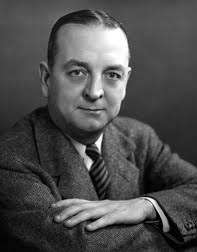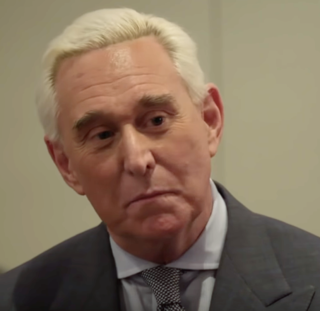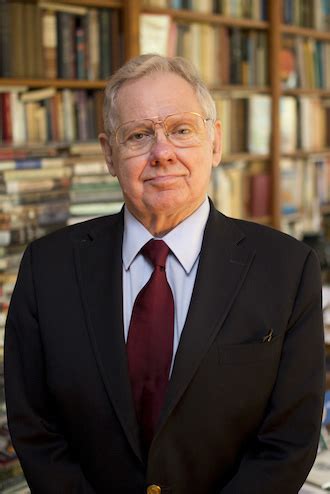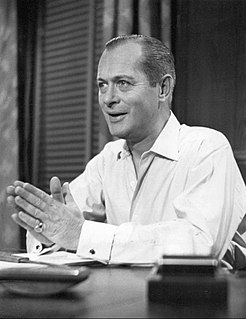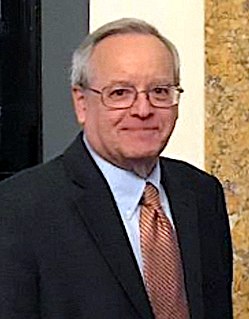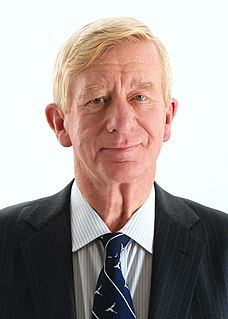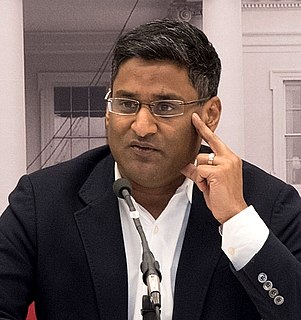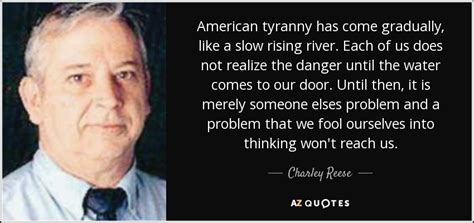Top 308 Libertarian Quotes & Sayings - Page 5
Explore popular Libertarian quotes.
Last updated on April 21, 2025.
I wrote about why I didn't think libertarians are really doing this kind of thing so that they can have sex with dogs. I discussed some of the reasons that a person might want to live out of the control of our federal, state, local, and every other form of government. Actually, I don't think I even called myself a libertarian. I think Tom Shroder identified me as one.
I'm not for pretending that bad stuff doesn't exist, and a passion for justice and truth is a libertarian trait. But the idea of liberty should also reveal new forms of beauty in the world, astonishing evidence of order without dictate, lovely examples of innovation without planning, and other magical things. Surely these deserve some attention too.
The U.S. has always been a contradiction. It's always been a deeply protectionist, institutional place, where you're not allowed to smoke, and you're not allowed to do this, and you're not allowed to do that. And then, on the other hand, it's completely libertarian in a way. So it's got this weird mixture of being incredibly authoritarian and incredibly open at the same time.
The libertarian good society lies... in the maximum dispersion of property compatible with effective production or, as process, in progressive reconciliation of conflicts between equality and efficiency. Such process involves increasing dispersion both of wealth among persons and families and of proximate productional control among enterprises or firms.
I think a lot of voters have certain cognitive dissidence. Donald Trump is getting social conservatives, economic conservatives, some Libertarian, some supply side conservatives, debt hawks. The conservative and Republican base is not monolithic. It has subsets that he seems to be appealing to all of them.
My personal credo as a libertarian conservative: I think all attempts to reform your fellow-citizens or tell them how to live their lives are arrogant and tyrannical. THAT'S why I oppose Leftism. I want people to be free to manage their own lives. Reform is just authoritarianism. People are not playthings for anybody's theories or obsessions.
The problem I have with socialist utopias is there's some kind of committees trying to soften outcomes for people. I think that imposes models of outcomes for other people's lives. So in a spiritual sense there's some bit of libertarian in me. But the critical thing for me is moderation. And if you let that go far you do end up with a winner-take-all society that ultimately crushes everybody even worse.
I'm a former lefty, I understand how vicious these people are, I understand that they feel they have the right to control the sandbox, and I am trying to orchestrate media that isn't just out there to push the right-of-center Libertarian narrative, I'm out there to destroy the false order, the false control that the left has in controlling the mainstream media in America.
The most important fact about American liberty is that it has never been a single idea, but a set of different and even contrary traditions in creative tension with one another. This diversity of libertarian ideas has created a culture of freedom which is more open and expansive than any unitary tradition alone could possibly be.
If anarcho-communism served to regiment the population in the name of libertarian unity, if it served in any way through collectivist measures to deny the rights of the individual instead of reconciling the rights of the individual with the collective, I would definitely stand completely on the side of the individualist who is trying to rescue above all that most precious thing that makes us human - consciousness and personality.
Civil libertarian activists are found overwhelmingly on the left. Their right-wing brethren have been concerned with issues more important than civil rights, voting rights, abuses by police and the military, and the subordination of politics to religion - issues like the campaign to expand human freedom by turning highways over to toll-extracting private corporations and the crusade to funnel money from Social Security to Wall Street brokerage firms.
I am really interested in who owns ideas of religion. What if I say I'm a libertarian, socialist, Occupy-supporting, anti-war, Christian? Is that a controversial idea? I don't see anything really in the original semiotics of Christianity, in the specific parable of the radical socialist Jew from Galilee who becomes the hero figure in the Homeric-word-of-mouth-gossip-novel that becomes the Bible that should make that a paradox.
There is a reason for the affected profession of " anarchist sympathies" among Tories and grandees, and of " libertarian principles" by Hobbesian yahoos of the right. Among the former, one sees the upholding of the view that a gentleman's business and property are his own, and none of the government's. Among the latter, a distaste for democracy, for taxation, and for the need to consult others about the planet.
I think the Republican Party has changed. I think our politics have changed. The parties have deteriorated in their strength. They decentralized. We have these new super PACs and outside organizations and the Tea Party, a libertarian movement in the Republican Party. It's very different. And I think these Republicans now are very scared.
The libertarian creed...offers the fulfillment of the best of the American past along with the promise of a far better future. Libertarians are squarely in the great classical liberal tradition that built the United States and bestowed on us the American heritage of individual liberty, a peaceful foreign policy, minimal government, and a free-market economy.
[Tomas] Jefferson is more out of fashion, both because of his views on race, where he's properly questioned, that part of his legacy, but also because the libertarian critique of bigness in business and government, the idea that size is a danger is something that's shared on the right when it comes to government and on the left when it comes to corporations, but not both.
No one may threaten or commit violence ('aggress') against another man's person or property. Violence may be employed only against the man who commits such violence; that is, only defensively against the aggressive violence of another. In short, no violence may be employed against a non-aggressor. Here is the fundamental rule from which can be deduced the entire corpus of libertarian theory.
I feel that if people investigate the emergence of government, of State power - if they examine the logic of State power historically, and more specifically in the United States - they will find that the concept of limited government is not tenable once they adopt some type of libertarian principle.
Prosperity and penury do not turn on gyno-centric and gay matters. But leftist statists and libertarians of the left place these wedge issues at the forefront of the fight for freedom. [...] Every bit as bad as liberals, "libertarian" political operators are prepared to shed political blood over any imagined sign of bigotry.
It became quite clear to me that the Natural Law mystique, in Catholic, libertarian or neo-pagan forms, remains basically a set of rhetorical strategies to hypnotize others into the state which Bernard Shaw called "barbarism" and defined as 'the belief that the laws of one's own tribe are the laws of the universe'.
I'm a complete libertarian. I think it's very, very dangerous. I really mean that. I think the smoking ban is a tip of an iceberg of society - the leaders of society telling us how to be. I think it's not their business. It's an attitude where the governors think, 'We know what's best for people, and they're so stupid that they would only not do it if we ban it.'
There are 316 million people in the United States of America. About six million of them watch 'Homeland,' Showtime's thriller about world terror, paranoia, and bipolar disorder. That's about 2 percent of the population; roughly what the guy with the beard running on the Libertarian Party ticket gets when he runs for Congress.
There's a certain libertarian right-wing view that there should be no FDA, that people can decide for themselves whether medicines are safe and effective. That's nonsense. Most people don't have the expertise or the resources to mount a proper study to find out whether a treatment is safe or effective.
I believe in the platform of the Libertarian party, which is different from that of the other two parties and I believe that it would be good for the country if the Libertarians were - had a seat at the table to speak truth to power of the other two parties, which now have this monopoly in Washington. Having said that, I'm not taking back anything I said about the massive difference between the two establishment party candidates.
At the earliest age, when I saw a 'wet paint' sign, I had to touch the paint to see if it was wet. When I get stopped at the stoplight in the middle of the night, and there's just no cars coming, and the light is red, I go. I don't think I'm putting anyone in harm's way, and I'll just take the consequences. Because I'm a Libertarian.
Ask a fellow if he favors organized prayer in the public schools. If he says 'No' he's a liberal. If he says 'Yes' he's a conservative. If he says, 'Public schools? The Constitution grants the government no power to run any mandatory tax-funded youth propaganda camps,' you have your hands on the wily libertarian.
The libertarian view is that human actors are self-owners and these self-owners are capable of appropriating unowned scarce resources by Lockean homesteading ? some type of first use or embordering activity. Obviously, an actor must already own his body if he is to be a homesteader; self-ownership is not acquired by homesteading but rather is presupposed in any act or defense of homesteading.
There are people, of course, who profess to be libertarian Marxists. I believe they mean very well, and I even write in their periodicals; but I write very militantly that I regard Marxism as a very subtle form of what I would call the totalitarian ideology - all the more subtle because it professes to advance the notions of freedom.
We must therefore turn to history for enlightenment; here we find that none of the proclaimed anarchist groups correspond to the libertarian position, that even the best of them have unrealistic and socialistic elements in their doctrines. Furthermore, we find that all of the current anarchists are irrational collectivists, and therefore at opposite poles from our position. We must therefore conclude that we are not anarchists, and that those who call us anarchists are not on firm etymological ground, and are being completely unhistorical.
A crucial difference between lite libertarians and the right kind is that to the former, the idea of liberty is propositional - a deracinated principle, unmoored from the realities of history, hierarchy, biology, tradition, culture, values. Conversely, the paleolibertarian grasps that ordered liberty has a civilizational dimension, stripped of which the libertarian non-aggression axiom, by which we all must live, cannot endure.
If you do not assume the law of non-contradiction, you have nothing to argue about. If you do not assume the principles of sound reason, you have nothing to argue with. If you do not assume libertarian free will, you have no one to argue against. If you do not assume morality to be an objective commodity, you have no reason to argue in the first place.
You have a country that is 20 percent liberal, 40 percent conservative. You have a country where maybe 22 percent have faith in government. If you're a liberal, it's just going to be tough. And you should just expect that. And it's tough for people on the right, too, because they don't get what they want either if you're, say, a libertarian. So, you have got the country sort of against you. And, nevertheless, you have a president.
Republicans ought to propose conservative answers to the concerns that are uppermost on most voters’ minds. The libertarian-populist method seems to be to start with the solutions and then to imagine that voters have the relevant concerns. And while many of the proposed solutions have great potential appeal to conservative voters, few would do much to expand their ranks.
The libertarian sees the State as a giant gang of organized criminals, who live off the theft called "taxation" and use the proceeds to kill, enslave, and generally push people around. Therefore, any property in the hands of the State is in the hands of thieves, and should be liberated as quickly as possible. Any person or group who liberates such property, who confiscates or appropriates it from the State, is performing a virtuous act and a signal service to the cause of liberty.
The work of democratic government is routinely concerned with matters defined as troubles. In "The Presidency and the Press" I make the point, familiar to anyone who has flown about the world much, that the best quick test of the political nature of a regime is to read the local papers on arrival. If they are filled with bad news, you have landed in a libertarian society of some sort. If, on the other hand, the press is filled with good news, it is a fair bet that the jails will be filled with good men.
Now, the Libertarian Party, is a *capitalist* party. It's in favor of what *I* would regard a *particular form* of authoritarian control. Namely, the kind that comes through private ownership and control, which is an *extremely* rigid system of domination - people have to... people can survive, by renting themselves to it, and basically in no other way... I do disagree with them *very* sharply, and I think that they are not..understanding the *fundamental* doctrine, that you should be free from domination and control, including the control of the manager and the owner.
The libertarian approach is a very symmetrical one: the non-aggression principle does not rule out force, but only the initiation of force. In other words, you are permitted to use force only in response to some else's use of force. If they do not use force you may not use force yourself. There is a symmetry here: force for force, but no force if no force was used.
The Kochs have been activists since the 1970s. You can go back and look at the platform of the Libertarian Party in 1980 and see what they really believe in. They wanted to abolish huge swaths of the U.S. government, including the Internal Revenue Service. They want to get rid of Social Security. They'd like to get rid of Medicare. They'd like to abolish the Environmental Protection Agency, which directly affects their business.
I believe that any attempt on the part of a libertarian communist society to abridge the rights of a community - for example, to operate on the basis of a market economy of the kind that you describe - would be unforgivable, and I would oppose the practices of such a society as militantly as I think any reader of your publication would.
There are two reasons [ business people are not publicly anti-Donald Trump ], one is well-intentioned, which is the classic kind of American notion. We want to be inclusive, we want to have our shareholders, our employees, our customers, whether they are Democrat, Republican, Green or Libertarian, to feel comfortable with how we're doing business. And so that tends to be apolitical. People say, "No, no, I just simply shouldn't get involved in politics."
Given the low level of competence among politicians, every American should become a libertarian. The government that governs least is certainly the best choice when fools, opportunists and grafters run it. When power is for sale, then the government power should be severely limited. When power is abused, then the less power the better.
Whether you're a populist; whether you're a limited government conservative; whether you're libertarian; whether you're an economic nationalist - we have wide and sometimes divergent opinions. The center core of what we believe, that America is a nation with an economy, not an economy just in some global marketplace with open borders, but we are a nation with a culture and a reason for being.
I'm basically a libertarian. I don't want to restrict anyone from doing anything unless it's going to harm me. I don't want [to] pass a law stopping someone from smoking. It's just too dangerous. You lose the concept of a free society. Since we are genetically so diverse and our brains are so different, we're going to have different aspirations.
The Road To Serfdom was written during WWII, and basically it's an anti-Nazi, anti-communist thing, but also it's an anti-Conservative and anti-Labor-party thing aimed at the British. He was an Austrian, writing in Britain. And I feel like now, I guess, everybody pays lip service to libertarian - and, indeed, many conservative - ideas, and yet they keep moving forward with an increasingly bureaucratic state. It shows itself in all sorts of little ways.
I've always considered myself a Libertarian. While I was running for governor of New Mexico, the Republicans were totally inclusive of me; the party was open-armed, but they never thought I'd win. I delivered in a really big way; I exceeded their expectations and think I'm still highly regarded by the GOP in New Mexico.
At the end of the day, Democrats go out and appeal to 30 percent of the far left; Republicans go out and appeal to 30 percent of the far right. Hey, there's a big middle ground here that's not represented. I think that, Bill Weld and myself, I think the Libertarian Party really occupies that ground.
Americans are coming to their senses, and the libertarian theory of society and government is pointing the way. The times change, but the enduring principles that help us to interpret and understand the world do not. It remains true now, as then, as in the future, saecula saeculorum, that government provides neither an effective nor a moral means for solving any human problem.
One concern I had while I was working actively in the intelligence community - being someone who had broad access, who was exposed to more reports than average individuals, who had a better understanding of the bigger picture - was that the post - World War II, post - Cold War directions of societies were either broadly authoritarian or [broadly] liberal or libertarian.




